[El Divisadero] ¿Salmonicultura sostenible? No en las áreas protegidas
Dos hechos recientes vuelven a demostrar el riesgo de la salmonicultura dentro de las áreas protegidas de la Patagonia. El primero, el fallo que...
[El Desconcierto] “El aumento de la marea roja agrava las múltiples crisis socioecológicas de la Patagonia”, alerta investigadora
Desde el cambio climático hasta la expansión salmonera están cambiando las condiciones ambientales en los mares de la Patagonia. La investigadora...
El llamado de la Patagonia: Llega el podcast Paraíso Enjaulado
La producción se enmarca en el objetivo de avanzar hacia la salida de las concesiones salmoneras de las áreas protegidas, sin relocalización en...
“El imperio del salmón”: La principal cadena de TV española expone impactos de salmoneras en la Patagonia chilena
Buscando seguir la ruta del salmón cultivado hasta los consumidores en Europa, un equipo de investigación viajó desde España hasta el sur de Chile...
Principal medio radial estadounidense expone los impactos de la industria del salmón en Chile
Cuestiona sus impactos en los ecosistemas marinos, su biodiversidad y las formas ancestrales de vida de los pueblos indígenas del sur austral....
[El Desconcierto] “La Patagonia es el último gran refugio climático para los bosques submarinos en el mundo”, alerta científico marino
Mauricio Palacios lleva años estudiando los bosques submarinos en la Patagonia chilena y el rol cada vez más importante que cumplen ante el...
[El Divisadero] Campaña Salvemos Patagonia: Entregan catastro de salmoneras en áreas protegidas a ministra Rojas
Organizaciones parte de la Alianza por la Defensa de las Áreas Protegidas concurrieron al Ministerio de Medio Ambiente para informar los objetivos...
Jacqueline Boldt, directora de Aysén Mira el Mar: “Las áreas protegidas son espacios de conservación, no para la industria”
En el contexto del Día Mundial de los Océanos, las fundadoras de Aysén Mira el Mar detallan la labor de educación ambiental y conservación que...
BBC aborda impactos de la industria del salmón en áreas protegidas
En el reportaje, la directora de Terram, Flavia Liberona, explicó los objetivos de la campaña Salvemos la Patagonia, enfocada en que “las granjas de...
Talleres en comunidades aledañas a reserva nacional Las Guaitecas constatan interés de habitantes en proteger esta área protegida
Esta percepción generó incomodidad en la industria del salmón y el alcalde Cisnes Francisco Roncagliolo, quienes cuestionaron las atribuciones y...
Dirigente de Islas Huichas interpela a autoridades en seminario sobre reservas nacionales y turismo por contaminación salmonera
En el marco del encuentro “Innovación, Gobernanza e Inteligencia Turística en Destinos con Áreas Protegidas de la Patagonia” que organizaron en...
[El Divisadero] En el sector del estero Cupquelan encuentran cetáceo fallecido: Armada y Sernapesca investigan el caso
El hallazgo ocurre en las proximidades del centro de cultivo Huillines 1, propiedad de Cooke Aquaculture y que está abandonado. Foto y texto: El...
Marca Patagonia invita a conversatorio sobre las consecuencias de la industria salmonera en las áreas protegidas
Este jueves 29 de mayo, a partir de las 19:30 horas, se desarrollará en Coyhaique el conversatorio “Salmoneras en áreas protegidas de la Patagonia”,...
Gonzalo Olea, biólogo marino: “La única forma de lograr la sustentabilidad en las pesquerías artesanales es con reglas claras y participación colaborativa”
El director de Manejo y Evaluación de Pesquerías de la ONG Pesca Sustentable ha sido testigo directo de los desafíos que enfrenta la pesca artesanal...
[El Desconcierto] Chile y el océano: Liderazgo internacional y contradicción interna
El Mes del Mar no puede limitarse a actos simbólicos y discursos vacíos, debe ser un momento crítico para preguntarnos qué futuro queremos para...
Con éxito se desarrolló en Coyhaique semana informativa sobre impactos de la industria del salmón
Una serie de actividades tendientes a sensibilizar a la población de Coyhaique ante los impactos de la industria del salmón, desarrolló durante la...
Presidente de Comisión de Medio Ambiente del Senado cuestiona “permisividad del gobierno respecto de la contaminación de las salmoneras”
Asimismo, hizo alusión a “La permisividad que ha tenido respecto de la contaminación de las salmoneras, la permisividad que se ha tenido de las...
Filtración de correos confirma que Australis planeó sobreproducción ilegal de salmones
Emails entre ejecutivos de Australis y Joyvio demuestran que la empresa salmonera ligada al empresario chileno Isidoro Quiroga planificó una...
Mientras Chile promociona salmón en Brasil, en Australia aumentan los cuestionamientos a la industria
En Australia y con miras a las elecciones federales del 3 de mayo, la oposición se ha comprometido a prohibir el ingreso de salmones provenientes...
Sobreproducción salmonera en la Patagonia: $200 millones en ganancias podrían quedar sin sanción
Millonarias ganancias habría generado la empresa Australis Seafood con casos de sobreproducción en 46 centros de cultivo. La Fundación Terram...
[El Divisadero] Las incómodas (y silenciadas) verdades de la salmonera Blumar
Por: Patricio Segura En la Memoria Integrada 2024 de la pesquera y salmonera Blumar, el presidente del directorio Rodrigo Sarquis Said hizo una...
Miguel Espíndola, biólogo marino: “Hay que privilegiar aquellos productos del mar provenientes de la pesca artesanal”
El Director de Conservación Oceánica de la ONG Pesca Sustentable analizó el estado actual de la pesca en Chile, entregó recomendaciones a los...
Peter Hartmann y su experiencia en el Barco de la Paz
Durante sus ponencias el activista de la Patagonia transmitió al público internacional las consecuencias de la industria salmonera en parques,...
[El Divisadero] Industria del salmón: Impermeable al aprendizaje en clave de bien común
Por: Patricio Segura Ortiz En el proceso de socialización, por el cual todos hemos pasado, fundamental es aprender a convivir con nuestros errores. ...
Chao Salmón: Movimiento por eliminar el salmón cultivado de las preparaciones toma fuerza entre chefs chilenos
Cocineros chilenos e internacionales han dejado de utilizar este producto en sus preparaciones, aludiendo a las prácticas contaminantes de la...
[Pressenza] Entrevista al investigador Paulo Moreno: «El litoral de Puerto Montt a Cabo de Hornos es el 37% de todas las costas de Sudamérica y ahí ocurre el 2% de las descargas globales de agua dulce al mar”
Por: Campaña Salvemos la Patagonia El doctor en Ciencias de Ecosistemas Marinos del Centro de Investigaciones en Ecosistemas de la Patagonia explica...
[Aisen Reserva de Vida] Las Opiniones del Gobernador Regional Respecto a la Salmonera Cooke
Por: Peter Hartmann, Director CODEFF Aisén, Presidente Agrupación Aisén Reserva de Vida Nefastas nos parecieron las opiniones vertidas por el...
[Pressenza] Empresa china Joyvio constata práctica ilegal de la salmonicultura: “La mayoría de las empresas sobreproducían en diversos grados”
En 2023 el consejo de administración de la empresa envió un informe a la bolsa de valores de China en Shenzhen, en el cual consignó una forma de...
[El Desconcierto] “Permisología”: Una coincidencia no tan sutil
Si Chile sigue los atajos que plantea el empresariado para apresurar los permisos, si el Estado hace oídos sordos frente a los argumentos...
[Aisen Reserva de Vida] Opinión Encuentro en Islas Huichas
Por: Peter Hartmann, Director CODEFF Aisén, Presidente Agrupación Aisén Reserva de Vida. No bien nos habíamos bajado de un barco cuando ya nos...
Día Mundial de los Ríos: Esa agua que no se pierde en el mar
Este 14 de marzo se conmemora el Día Mundial de Acción por los Ríos que busca generar conciencia sobre la relevancia de las cuencas en el mundo, por...
[G5 Noticias] Juzgado de Puerto Aysén condena a salmonera con multa de $34 millones y suspende operaciones en nueve centros de cultivo
Se incluyen en éstos los centros Huillines 2 y Huillines 3, ubicados al interior del Parque Nacional Laguna San Rafael. Por entrega de información...
[El Divisadero] Las opiniones del gobernador regional respecto a la salmonera Cooke
Por: Peter Hartmann, Coordinador Coalición Ciudadana por Aisén Reserva de Vida. Nefastas nos parecieron las opiniones vertidas por el Gobernador...
[El Divisadero] Salvemos Patagonia presente en Expo Patagonia informando sobre importancia de áreas protegidas
Actualmente en la Patagonia chilena existen 1.380 concesiones de la industria del salmón vigentes (a 2024). De ellas, 408 se ubican dentro de las...
[El Divisadero] Sube de tono discusión por declaraciones de ejecutivo de empresa salmonera
De "infundadas" califican declaraciones que apuntan a que existiría "coordinación entre la SMA y la sociedad civil". Desde Ecosur y Chile...
[Pressenza] María José Martínez-Harms, investigadora: “Las áreas protegidas en la Patagonia Chilena siguen siendo de papel ante el impacto de la salmonicultura y el cambio climático”
La académica de la Universidad Santo Tomás y Dra. en Ciencias de la Conservación de la Biodiversidad de la Universidad de Queensland, María José...
[El Periodista] Organización de Aysén revela «prontuario ambiental» de salmoneras Ventisqueros y Cooke Aquaculture
Se pregunta por qué a pesar de los esfuerzos de la industria de acusar “persecución”, el organismo fiscalizador sólo está haciendo que se cumpla la...
[Carta al director en El Mercurio] SMA y Cooke Aquaculture II
Señor Director: El gerente de Cooke Chile, Andrés Parodi, acusa la existencia de una especie de alianza entre la Superintendencia del Medio Ambiente...
[Carta al director en El Mercurio] “La ética del SMA II”
El gerente de Cooke Chile dijo que la Superintendencia del Medio Ambiente quiere “destruir una empresa extranjera”, a propósito del procedimiento...
[Bío Bío] Datos no opiniones: la salmonicultura en Chile
Por: Patricio Segura Ortiz [Leer nota biobiochile] Recientemente, el director de Comunicaciones y Asuntos Públicos de Ventisqueros (Productos del...
[Aisén Reserva de Vida] Opinión Navegando y Conferenciando en el Barco de la Paz
Por: Peter Hartmann, Director CODEFF Aisén, Presidente Agrupación Aisén Reserva de Vida. En una columna anterior escribimos sobre que es el Barco de...
[Crónica digital] Industria salmonera y especies en peligro: Científicos alertan sobre su impacto en la fauna marina de Chile
Por Patricio Segura [Leer en Crónica digital] Industria salmonera y especies en peligro: Científicos alertan sobre su impacto en la fauna marina de...
[El Divisadero] Estudio científico del IEB alerta sobre adverso impacto salmonicultor en áreas protegidas
[Leer en El Divisadero] La investigación citada se centró en el estudio de hábitats de algas pardas gigantes (Macrocystis pyrifera) en tres áreas...
[El Divisadero] Mientras avanza prohibición de salmonicultura en Estados Unidos, en Chile se la permite en áreas protegidas
Por Patricio Segura Ortiz [Leer en El Divisadero] Mientras que en Chile la industria salmonera se desarrolla dentro de áreas marinas protegidas, en...
[El Divisadero] “Bienestar de los peces” a la chilena: Ridículo para la ley de Pesca, perfecto para la publicidad
Por Patricio Segura Ortiz [Leer en El Divisadero] En julio de 2024 se generó gran batahola por una indicación del diputado (RD) Jorge Brito que...
[Actualidad] El calentamiento global y la salmonicultura amenazan a los bosques de algas gigantes de la Patagonia chilena
Por: Maolis Castro [Leer en El País] Una investigación del Instituto de Ecología y Biodiversidad indica que los ecosistemas de macroalgas en tres...
[Campaña] Cuidado de mamíferos marinos no solo aplica en las costas, indican desde campaña Salvemos la Patagonia
[Leer en codexverde] A raíz de la invitación de Sernapesca a cuidar la fauna marina que se acerca a las playas, desde la campaña Salvemos la...
[El Desconcierto] Ballena muerta en Aysén y la responsabilidad de Cooke Aquaculture
Por: Romanet Seguel-Rojas Manquez [Leer en El desconcierto] Pero más allá del número y de sus ilegalidades, la pregunta es, por qué el Estado de...
[El Mostrador] Pamela Meneses, experta en pesca: “No estamos logrando equilibrio entre conservación y producción”
Por : Marco Fajardo Caballero [Leer en el Mostrador] Pamela Meneses Tapia, subdirectora de ONG Pesca Sustentable, será parte de Congreso...
[Campaña] Caso Australis y formalización de exejecutivos demuestra que crecimiento de parte de la industria salmonera ha sido ilegal
El Ministerio Público formalizó a Isidoro Quiroga, exejecutivo y anterior propietario de la empresa salmonera Australis Seafoods y decretó su...
[Campaña] Posición de la Alianza ante el caso Dominga
Desde la Alianza por la Defensa de las Áreas Protegidas, que impulsa la campaña ¡Salvemos la Patagonia! y que está compuesta por 52 organizaciones,...
[Radio U.Chile] Salmonera que opera en Chile es acusada de contaminar en Estados Unidos
Por: Patricio Segura (Leer noticia en Radio UChile) La organización Conservation Law Foundation inició una demanda en contra de Cooke Aquaculture...
[Bío Bío] Formalización por sobreproducción salmonera: Australis y el daño ambiental en reservas nacionales
Por: Juan Pablo Orrego S., Presidente de Ecosistemas, miembro campaña Salvemos la Patagonia (Leer noticia en Bío Bío) "La autoridad no solamente no...
[DiarioPuertoVaras] Valoran llamado a cumplir la ley en caso Quiroga y sobreproducción de salmonera Australis
Por Eliana Chong (Leer noticia en DiarioPuertoVaras) La decisión de la Fiscalía de formalizar a tres ejecutivos de la empresa, viene a refrendar una...
[CIPER] Áreas protegidas de la Patagonia están asfixiadas por el cultivo industrial de salmones
Por: Daniel Espinoza y Maximiliano Bazán (Leer noticia en CIPER) En esta columna escrita para CIPER se dan los detalles de un estudio realizado por...
[Campaña] Del dirigente ambientalista Peter Hartmann Samhaber: Liberan completo informe sobre el impacto ambiental de 30 años de salmoneras en áreas protegidas de Aysén
Por: Patricio Segura El objetivo es “dar a conocer, transparentar y evaluar la ubicación e impactos de las concesiones salmoneras en las áreas...
[Campaña] Despedimos el 2024 organizados para sacar las salmoneras de las Áreas Protegidas
Foto:(c) R. Hucke-Gaete (Centro Ballena Azul) Este año, nuestra campaña Salvemos la Patagonia dio su primer gran paso, cuando en agosto lanzamos...
[El Divisadero] Salmon farms in Aisén's protected areas
By: Peter Hartmann, Coordinator of the Citizen Coalition for Aisén Reserve of Life (Read column in El Divisadero) The title of this column is also...
[Bío Bío] Response to Pivots: Debunking the salmon industry's sustainable growth myths
By: Cristopher Toledo, Terram (Read news in Bío Bío) The debate on salmon farming in Chile must transcend the narratives of stagnation and...
[Bío Bío] "Is sustainable salmon farming possible in Chile? Yes, we can do something.
By: Miriam Chible Contreras, Director Corporación Privada para el Desarrollo de Aysén (Read news in Bío Bío) There are issues of interest...
[Save Patagonia] Humpback whales found dead in and around salmon farms in Patagonia's protected areas
Crews from tourism companies in Aysén reported the discovery in the Laguna San Rafael National Park, adjacent to the facilities of the...
[Campaña] Alianza por la Defensa de las Áreas Protegidas: Ya somos medio centenar de organizaciones
Since the official launching of our Save Patagonia campaign, we have continued to grow and strengthen, and today we have reached a total of 50...
[Campaña] ¡Estuvimos en el Festival Ladera Sur 2024!
An intense exchange of ideas and dissemination of the Save Patagonia campaign was carried out by the members of the Alliance for the Defense of the Patagonian...
[Follow the Money] The fish you are buying may not be as sustainable as you think.
By: Rémy Käller (Read news on Follow the Money) Consumers who look for a "sustainable" label when buying salmon in...
[Bío Bío] Stagnation in the salmon industry? Figures show another reality
By: Cristopher Toledo, Terram (Read news in Bío Bío) Chile continues to be the second largest exporter of salmon in the world, which has...
[ElDesconcierto] Even Patagonia brand accuses salmon companies of leaving "dead zones" in protected seas of southern Chile
Por María del Mar Parra (Leer noticia en ElDesconcierto) Más de 400 salmoneras operan en Parques y Reservas Nacionales de la Patagonia, incumpliendo...
[El Divisadero] Overproduction in salmon farms: Figures of an illegal and unsustainable practice that the industry has made the norm
By: Erwin Sandoval Gallardo, Codesa (Read news in El Divisadero) A little over a week ago, the Superintendencia del Medio Ambiente (SMA)...
[Campaña] Campaña Salvemos la Patagonia publica catastro sobre concesiones salmoneras en áreas protegidas
The document reports worrying figures on the presence of the salmon farming industry in National Parks and National Reserves of the Chilean Patagonia...
[Campaña] Ministro Grau se reúne con representantes de campaña Salvemos la Patagonia que busca retirar salmonicultura de áreas protegidas
At the meeting, the authority was asked to instruct the Undersecretariat of Fisheries and Aquaculture to review the cases of circumvention of the System of...
[El Divisadero] Pact for the development of Aysén or new bailout for an unsustainable industry?
By: Erwin Sandoval Gallardo, Codesa (Read news in El Divisadero) "Regional GDP: Aysén was the territory with the worst performance in the second quarter of...
[El Mercurio Letters] Salmon farming concessions
By Carolina Morgado, Executive Director Fundación Rewilding Chile (Read news in Litoralpress) Mr. Director: The ratification by the Comptroller...
[Radio U de Chile] Comptroller's Office and salmon farming concessions: a step forward for conservation
By Carolina Morgado (Read news on Radio U de Chile) In November 2023, a group of parliamentarians, together with the Salmon Council and SalmonChile,...
[Patagon Journal] New campaign launched to end salmon farming in Chile's protected areas
By Francisca Lopez Espinoza [Read news in Patagon Journal] Last month a new coalition of 37 Chilean organizations was formed, called...
[El Mercurio] Comptroller's Office backs SBAP Law criteria for requiring management plan for salmon farm relocations
[Read news in El Mercurio] At the end of August, the Comptroller General of the Republic (CGR) issued an opinion supporting the criteria defined by the...
[Terram] Is the salmon industry willing to respect current regulations?
By: Flavia Liberona, Terram (Read news in Terram) Since 2023 the Chilean salmon industry has had a strong presence in the media...
[Campaña] Lanzan campaña para salida de salmonicultura dentro de áreas protegidas
The Alliance for the Defense of Protected Areas, made up of 37 organizations, announced the initiative, amidst the commotion caused by a...
[El Divisadero] The State's biggest subsidy: (Supposedly) protected areas at the service of the salmon industry
By: Erwin Sandoval Gallardo, Codesa (Read news in El Divisadero) A few weeks ago we read both the main representatives of the...
[New York Times] In Chile, salmon is a source of controversy and opposition
By: Lucy Meyer and Casey Ann Smith (Read NY Times story) The sea is calm at sunset on Quinchao, the home island of Tarsicio Antezana, in...
[Bío Bío] Salmon companies: Comptroller's Office detects lack of control by Sernapesca that prevents termination of concessions
By: Constanza Carrillo (Read news in BioBio) The Office of the Comptroller General of the Republic (CGR) detected a lack of control on the part of the...
[Ciper] The persistent circumvention of the Environmental Law by salmon farms that the government agreed to relocate
By: Maximiliano Bazán (Read news in Ciper) Last December, and with great fanfare, the Chilean government announced an agreement with the...
[Aisen Reserva de Vida] Desertifying the Patagonian Sea
The colossal use of antimicrobials in commercial salmon farming in Chile presents dangers for the health of animals, people and the environment, describes in a column for CIPER a specialist on the subject. Faced with the support of authorities for the expansion of salmon farming in protected areas, he warns: "More than a specific pathogen, diverse information and investigations seem to point to the fact that it is the generalized and uncontrolled overproduction in the industry that is the major cause of the high mortalities of fish due to infections".
[Ciper] 95 cases of salmon overproduction in national reserves without sanction (part 2)
A series of violations of environmental regulations by the salmon industry are set to expire this May if the Superintendency of the Environment (SMA) does not file the appropriate charges. Thus, the harvesting of more than 67,000 tons of salmon in excess of the authorized limits by nine companies with a presence in the National Reserves of Las Guaitecas and Kawésqar will remain without fine or sanction. This investigation for CIPER by the Terram Foundation exposes in two parts the details of these huge private operations and their effects on the fauna and natural environment that hosts them, in the midst of the expansion of the industry to Magallanes.
[Ciper] 95 cases of overproduction of salmon in national reserves without sanction (part 1)
A series of violations of environmental regulations by the salmon industry are set to expire this May if the Superintendency of the Environment (SMA) does not file the appropriate charges. Thus, the harvesting of more than 67,000 tons of salmon in excess of the authorized limits by nine companies with a presence in the National Reserves of Las Guaitecas and Kawésqar will remain without fine or sanction. This investigation for CIPER by the Terram Foundation exposes in two parts the details of these huge private operations and their effects on the fauna and natural environment that hosts them, in the midst of the expansion of the industry to Magallanes.
[Aisen Reserva de Vida] Salmon Farms and Human Rights
By: Peter Hartmann (Read news in Aisen Reserva de Vida) Last week more than one hundred civil society organizations sued the government...
[Aisen Reserva de Vida] ¿A Alguien le Importan los Parques Nacionales?
By: Peter Hartmann (Read the news in Aisen Reserva de Vida) The publication of the land subdivision of part of the Cerro...
[U de Chile Newspaper] "They are used as a financial instrument": Terram Foundation warns about salmon farming concessions in the process of expiring
By: Natalia Palma (Read news in Diaria U de Chile) In the midst of the conflict between the salmon industry and the indigenous communities...
[Ciper] Legal non-compliance of salmon businesses that the government agreed to relocate
In the midst of the debate on the illegitimacy of lobbying between fishing companies and government authorities, an agreement has been announced that grants the relocation of nine concessions to two companies that have ongoing sanctioning procedures at the SMA and have incurred in grounds for expiration, for different reasons. A member of the Terram Foundation details the characteristics of each of these irregularities, of which the government should have been aware at the time of granting the permits. The situation, at least, "raises doubts about the environmental standards of the relocation policy and whether the authorities reviewed these antecedents before signing and taking the photo", according to his analysis.
[Ciper] At Pablo Zalaquett's house: the secretive meeting where ministers Grau and Rojas brought positions closer to salmon industry
The meeting between business leaders and the ministers of Economy and Environment was not registered in Infolobby, despite the fact that it was called by a figure who has signed up as a lobbyist in that platform: Pablo Zalaquett, former mayor and former senatorial candidate indicted in cases of illegal political financing. Among those summoned were leaders of the salmon industry. CIPER consulted Ministers Grau and Rojas for the names of the attendees, but they were not disclosed. Three weeks after the meeting, the government presented the new Fishing Law. Minister Grau ruled out that this topic was part of the conversation. One of the attendees was Rodrigo Sarquis, owner of Blumar, a company dedicated to fishing and aquaculture.
[El Mostrador] Chile wins second consecutive Tourism Oscar for the best green destination in the world
By: Revista Jengibre (Read news in El Mostrador) Chile was awarded as the Best Green Destination in the World at the thirtieth edition of the...
[Bío Bío] Massive salmon mortality: 365 tons of specimens in Cochamó farms confirmed to have been withdrawn
Mortality corresponds to 486.4 tons of Coho and Trout species, representing 1.62% of the total biomass.
[El Mostrador] SBAP Law: Why is the salmon industry complaining?
Although Law 21,600 establishes that sectoral concessions may not be granted in three categories of protected areas (National Parks, Natural Monuments and Virgin Region Reserves), it is important to note that these limitations already existed.
[La Tercera] Salmon farming unions evaluate legal actions against government's decision to halt concessions in protected areas
At the moment they envision two ways to eventually launch an attack against the Ministry of the Environment's decision. The first one points to an appeal for protection, appealing to the freedom of enterprise guaranteed by the Constitution, and should be processed before the Court of Appeals of Santiago, while the second route would be through an injunction before the Comptroller General of the Republic.
[Patagon Journal] Whale deaths continue in salmon farming areas of Chilean Patagonia
(Read news in Patagon Journal) In the context of increasing cetacean mortalities in Chilean Patagonia, the stranding and subsequent death of a...
[El Mostrador] Undersecretary for the Armed Forces maintains 390 salmon farming concessions without clarifying their expiration date
By: Emilia Aparicio (Read news in El Mostrador) Based on information obtained by Fundación Terram, through the Transparency Law, between...
[U of Chile Press] Chilean Patagonia stores almost twice as much carbon per hectare as the Amazon forest
By: Ma. Fca. Maldonado Wilson (Read news in Prensa U de Chile) "How much carbon do the terrestrial ecosystems of Chilean Patagonia store?"...
[Ciper] The microbiological threat of salmon farming to our health
The colossal use of antimicrobials in commercial salmon farming in Chile presents dangers for the health of animals, people and the environment, describes in a column for CIPER a specialist on the subject. Faced with the support of authorities for the expansion of salmon farming in protected areas, he warns: "More than a specific pathogen, diverse information and investigations seem to point to the fact that it is the generalized and uncontrolled overproduction in the industry that is the major cause of the high mortalities of fish due to infections".
[Bío Bío] Antibiotic use in Chilean salmon farms increased by 24% between 2019 and 2022 despite reduction plan
Although the salmon industry in Chile has made efforts to reduce the use of antibiotics, climate change and the pandemic caused an increase between 2019 and 2022.
[Bío Bío] House approves SBAP Law: Minister Maisa Rojas warned of "pending inconsistencies".
According to the government, it is the most important environmental initiative of the last decade. However, Minister Rojas warned that there were "pending inconsistencies", after a controversial indication introduced by the Executive was not approved.
[Bío Bío] Los Lagos: the discussion on the continuity of operations of the salmon industry in protected areas
An intense discussion regarding the continuity of salmon farming operations in protected areas is taking place in the Los Lagos region, bringing together environmental organizations, parliamentarians and companies in the industry.
[La Tercera] Maisa Rojas explains that the Law for Nature is not retroactive and that they are clear rules for salmon industry
By: Paulina Ortega (Read news in La Tercera) The Minister of Environment, Maisa Rojas, referred to the doubts that have arisen with the...
[La Tercera] "Our overproductions in the XII are very heavy... I hope they don't appear in the press": The emails included in Australis' lawsuit against Isidoro Quiroga
By: Catalina Marconi and Leslie Ayala (Read news in La Tercera) This Friday Australis filed a lawsuit against the former owner Isidoro...
[ADN Radio] "Aquariums that are never cleaned": the impacts of salmon farming in the Magallanes Region
The salmon industry has ended up affecting native marine species in Magallanes, where this activity has been increasingly accentuated.
[Future 360] The Chilean dolphin, an endemic species under threat from aquaculture industry
Industrial activities such as salmon farming, marine garbage, climate change and misinformation are some of the threats facing the Chilean dolphin population.
[Bío Bío] Salmon companies risk $3 billion in fines for overproduction in protected area centers
By: Emilio Lara (Read news in Bío Bío) The Environmental Superintendency (SMA) initiated three sanctioning procedures for...
[La Prensa Austral] Sernapesca filed 42 complaints to salmon farming companies for non-compliance and planting more fish than authorized
(Read news in La Prensa Austral) Last year, the regional directorate of the National Fisheries Service in Magallanes filed 42 complaints against...
[Duna] The unknown cold waves discovered by a Chilean scientist in the Patagonian Sea
By: Loreto Concha (Read news in Aisen Reserva de Vida) While researching the warm sea surface temperature events of the...
El Mostrador] President Boric: "Industries such as salmon farming have to leave protected areas" [El Mostrador] President Boric: "Industries such as salmon farming have to leave protected areas".
"We want to say very clearly to the different industries that coexistence here has to be in terms of respect for the community and the environment," said President Gabriel Boric during his visit to the Magallanes region.
[El Mostrador] Strong presence of antibiotics from salmon farming in Chiloé found, putting biodiversity at risk
Juan Navedo, an academic of the PhD in Marine Biology and PhD in Ecology and Evolution of the Faculty of Sciences of the Universidad Austral de Chile (UACh), found, through research, a strong presence of antibiotics in the coastal wetlands of the island of Chiloé, evidencing the widespread presence of bacteria resistant to these drugs that endanger wildlife on a global scale and the treatment of diseases in both animals and humans.
[Deutsche Welle] Chile: Protests against salmon farms in protected areas
Despite having state protection status, areas of Chilean Patagonia set aside for conservation are not free of salmon farms. Social and environmental organizations demand a more restrictive law.
[Deutsche Welle] Massive salmon die-off in Chile puts industry in the spotlight
In Chile, the world's second largest producer of salmon, nearly 6,000 tons of fish died recently due to the growth of a harmful algal bloom attributed to climate change and the industry itself.
[National Geographic] What Patagonia's fjords are hiding
By: Eva van den Berg (Read news in National Geographic) In the Chilean Patagonia has its headquarters the biologist Vreni Häussermann, one of the...
[El Mostrador] Veterinarians call for maximizing efforts to eliminate remaining salmon mortality and hope for corrective measures
The area is home to an infinite number of species that are highly susceptible to environmental changes.
[Mongabay] Chile: more than 5 thousand tons of salmon dead due to "brown tide" that threatens ecosystem in Patagonia
More than 5,000 tons of salmon have died in the farms due to the brown tide and Patagonia's marine biodiversity is at serious risk.
[La Tercera] Study identifies worrisome threats to Chilean dolphins in Northern Patagonia: Salmon farming and gillnets targeted
By: Claudia Soto (Read news in La Tercera) The largest populations of Chilean dolphins are composed of approximately 60 individuals. Thus...
[La Tercera] Mortality of salmon due to harmful algae continues to increase and now totals more than 4,500 tons
A total of 18 cultivation centers have active action plans in case of massive mortalities, of which 6 correspond to the Los Lagos region and 12 to the Aysén region.
[Mongabay] Chile: Scientists show how whales are besieged by hundreds of ships in Patagonia
By: Michelle Carrere (Read news in Mongabay) For the first time, scientists have been able to demonstrate with an image the impacts that the transit...
[Ciper] New salmon escape in Los Lagos: a political problem
Two weeks ago 800,000 salmon escaped from a farm in Reloncaví Sound. This is the latest example of a cyclical disaster: between 2010 and 2018 there were 87 similar events.
[Ciper] New salmon escape in Los Lagos: a political problem
Two weeks ago 800,000 salmon escaped from a farm in Reloncaví Sound. This is the latest example of a cyclical disaster: between 2010 and 2018 there were 87 similar events. The authors do not see here "accidents" but rather problems of oversight and sanction originating in a regulation that has focused on "providing sanitary guarantees to the industry" and only marginally on strengthening environmental care. The authors emphasize that the salmon industry condenses many contradictions of the Chilean economic model, as it owes its successful global insertion and high level of competitiveness to "processes of environmental degradation and territorial inequality".
[La Tercera] Patagonia's importance as a refuge for marine life and biodiversity highlighted at COP25
Representatives from the scientific, academic, community and civil society worlds emphasized the creation, expansion and effective implementation of protected areas in this vast and pristine territory, which is viewed as a refuge from the current climate change scenario.
[France 24] Chilean Patagonia, a natural laboratory for the study of climate change
By: Seno Ballena (Read news on France 24) In one of the most inhospitable places on the planet, the Chilean Patagonian sea is giving light...
[El Mostrador] The impact of salmon farming on the acidification of the sea and anoxia in Chilean Patagonia
According to Sernapesca, there have been more than 600 aquaculture concessions that generated anaerobic conditions (the majority of salmon and the minority of mithilids) in our sea. With these numbers the reduction of oxygen would be 35-118 times more than that attributed to global climate change; and the reduction of pH in the water would be 10 times greater (8.1 to 7.1 at the bottom), corresponding to an acidification of 900%. Oxygen depletion at these levels causes suffocation and death of most organisms, and such acidification levels would prevent the formation of shells and calcareous skeletons of very many marine organisms.
[Cooperativa] Concern over contamination of National Parks in the Aysén Region
Complaints in social networks point to waste linked to the salmon industry in Laguna San Rafael.
[New York Times] An escape of nearly 700,000 salmon in Chile alarms environmentalists
The escape of 690,000 Atlantic salmon from a Norwegian company's cages in southern Chile has deepened concerns about the impact of industrial aquaculture on Chile's marine ecosystems and the livelihoods of artisanal fishermen.
![[El Divisadero] ¿Salmonicultura sostenible? No en las áreas protegidas](https://www.salvemoslapatagonia.cl/web/wp-content/uploads/2024/12/tc_archive_acuicultura_dsc3235-400x250.jpg)
![[El Desconcierto] “El aumento de la marea roja agrava las múltiples crisis socioecológicas de la Patagonia”, alerta investigadora](https://www.salvemoslapatagonia.cl/web/wp-content/uploads/2025/07/18572-1-a-entrevista-marearoja-400x250.jpg)
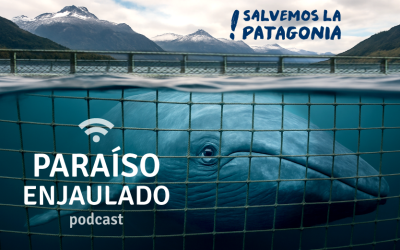
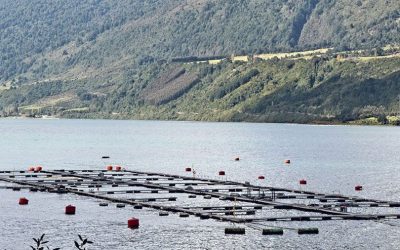
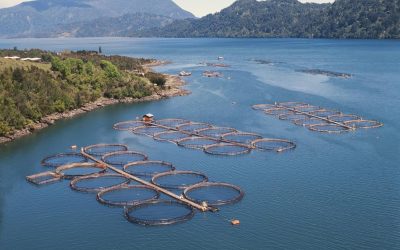
![[El Desconcierto] “La Patagonia es el último gran refugio climático para los bosques submarinos en el mundo”, alerta científico marino](https://www.salvemoslapatagonia.cl/web/wp-content/uploads/2025/06/Macrocystis_pyrifera9_StratofMagellan_Chile-400x250.jpg)
![[El Divisadero] Campaña Salvemos Patagonia: Entregan catastro de salmoneras en áreas protegidas a ministra Rojas](https://www.salvemoslapatagonia.cl/web/wp-content/uploads/2025/06/mma-3-400x250.jpg)
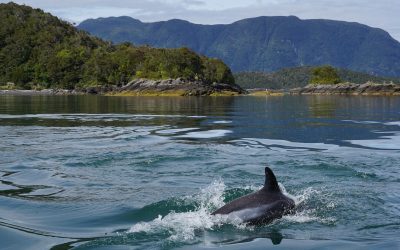
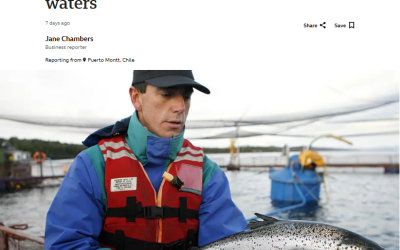

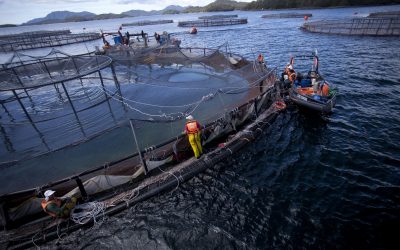
![[El Divisadero] En el sector del estero Cupquelan encuentran cetáceo fallecido: Armada y Sernapesca investigan el caso](https://www.salvemoslapatagonia.cl/web/wp-content/uploads/2025/06/Foto-El-Divisadero-400x250.jpeg)
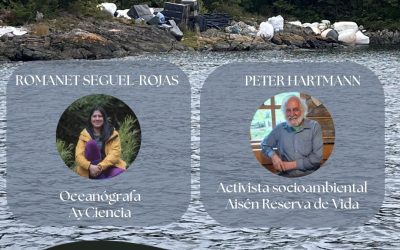
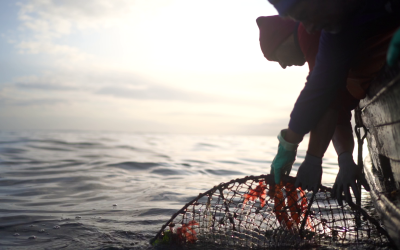
![[El Desconcierto] Chile y el océano: Liderazgo internacional y contradicción interna](https://www.salvemoslapatagonia.cl/web/wp-content/uploads/2025/03/foto_region_de_aysen_dji0473-400x250.jpg)
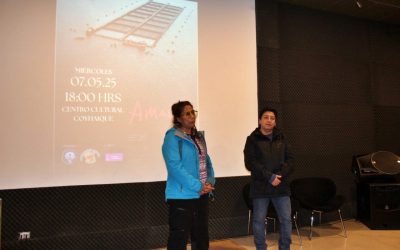

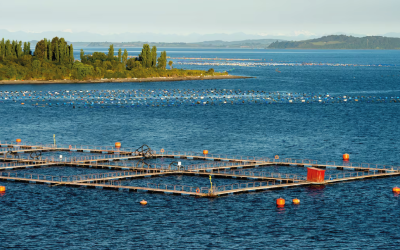
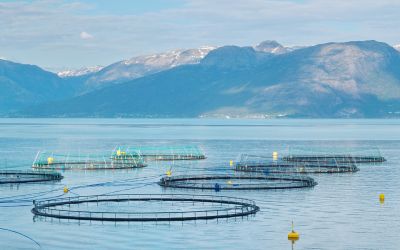
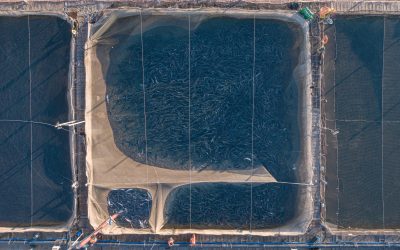
![[El Divisadero] Las incómodas (y silenciadas) verdades de la salmonera Blumar](https://www.salvemoslapatagonia.cl/web/wp-content/uploads/2025/01/Sin-titulo-2-400x250.png)
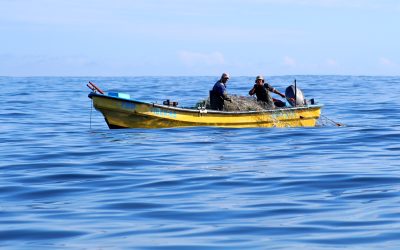
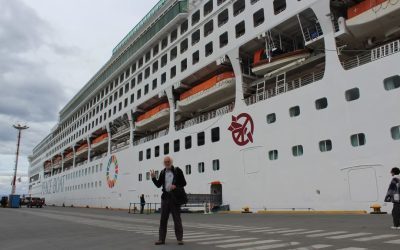
![[El Divisadero] Industria del salmón: Impermeable al aprendizaje en clave de bien común](https://www.salvemoslapatagonia.cl/web/wp-content/uploads/2025/03/Centro-de-cultivo-en-Parque-Nacional-Laguna-San-Rafael-400x250.jpg)
![[Aisen Reserva de Vida] Las Opiniones del Gobernador Regional Respecto a la Salmonera Cooke](https://www.salvemoslapatagonia.cl/web/wp-content/uploads/2025/03/Peter-hartman-columna-400x250.jpg)
![[Pressenza] Empresa china Joyvio constata práctica ilegal de la salmonicultura: “La mayoría de las empresas sobreproducían en diversos grados”](https://www.salvemoslapatagonia.cl/web/wp-content/uploads/2025/03/05-DJI_0772-1-400x250.jpg)
![[Aisen Reserva de Vida] Opinión Encuentro en Islas Huichas](https://www.salvemoslapatagonia.cl/web/wp-content/uploads/2025/03/dji_fly_20250315_111015_0_1742047815730_photo_low_quality-400x250.jpg)
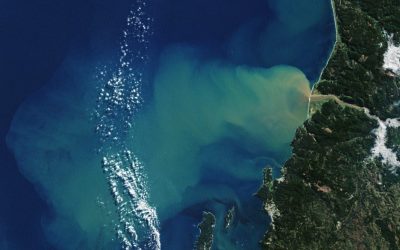
![[El Divisadero] Salvemos Patagonia presente en Expo Patagonia informando sobre importancia de áreas protegidas](https://www.salvemoslapatagonia.cl/web/wp-content/uploads/2025/03/IMG_6930-400x250.jpg)
![[El Divisadero] Sube de tono discusión por declaraciones de ejecutivo de empresa salmonera](https://www.salvemoslapatagonia.cl/web/wp-content/uploads/2025/03/Fotos-Salmoneras-400x250.jpg)
![[Pressenza] María José Martínez-Harms, investigadora: “Las áreas protegidas en la Patagonia Chilena siguen siendo de papel ante el impacto de la salmonicultura y el cambio climático”](https://www.salvemoslapatagonia.cl/web/wp-content/uploads/2025/03/Macroalgas-400x250.jpg)
![[El Periodista] Organización de Aysén revela «prontuario ambiental» de salmoneras Ventisqueros y Cooke Aquaculture](https://www.salvemoslapatagonia.cl/web/wp-content/uploads/2025/03/Salmoneras_en_Queilen-400x250.jpg)
![[Carta al director en El Mercurio] SMA y Cooke Aquaculture II](https://www.salvemoslapatagonia.cl/web/wp-content/uploads/2024/11/Captura-de-pantalla-2024-11-12-174235-400x250.png)
![[Carta al director en El Mercurio] “La ética del SMA II”](https://www.salvemoslapatagonia.cl/web/wp-content/uploads/2025/02/20241023_114654-400x250.jpg)
![[Bío Bío] Datos no opiniones: la salmonicultura en Chile](https://www.salvemoslapatagonia.cl/web/wp-content/uploads/2025/02/Captura-de-Pantalla-2025-02-26-a-las-10.16.46-400x250.png)
![[Aisén Reserva de Vida] Opinión Navegando y Conferenciando en el Barco de la Paz](https://www.salvemoslapatagonia.cl/web/wp-content/uploads/2025/02/Peter-Hartman-presentacion-400x250.jpeg)
![[Crónica digital] Industria salmonera y especies en peligro: Científicos alertan sobre su impacto en la fauna marina de Chile](https://www.salvemoslapatagonia.cl/web/wp-content/uploads/2025/02/Chungungo-en-Area-marina-costera-Pitipalena-Anihue-Foto-de-Nathalie-Brito-Vergara-400x250.webp)
![[El Divisadero] Estudio científico del IEB alerta sobre adverso impacto salmonicultor en áreas protegidas](https://www.salvemoslapatagonia.cl/web/wp-content/uploads/2025/02/Copia-de-Fotos-centros-de-cultivo-PNLSR-28-400x250.jpg)
![[El Divisadero] Mientras avanza prohibición de salmonicultura en Estados Unidos, en Chile se la permite en áreas protegidas](https://www.salvemoslapatagonia.cl/web/wp-content/uploads/2025/02/creditos-400x250.png)
![[El Divisadero] “Bienestar de los peces” a la chilena: Ridículo para la ley de Pesca, perfecto para la publicidad](https://www.salvemoslapatagonia.cl/web/wp-content/uploads/2025/02/Copia-de-Plantilla-Noticias-400x250.png)
![[Campaña] Cuidado de mamíferos marinos no solo aplica en las costas, indican desde campaña Salvemos la Patagonia](https://www.salvemoslapatagonia.cl/web/wp-content/uploads/2025/01/lobos-de-mar-400x250.png)
![[El Desconcierto] Ballena muerta en Aysén y la responsabilidad de Cooke Aquaculture](https://www.salvemoslapatagonia.cl/web/wp-content/uploads/2025/01/ballena-creditos-400x250.png)
![[El Mostrador] Pamela Meneses, experta en pesca: “No estamos logrando equilibrio entre conservación y producción”](https://www.salvemoslapatagonia.cl/web/wp-content/uploads/2025/01/boletin-creditos-400x250.png)
![[Campaña] Posición de la Alianza ante el caso Dominga](https://www.salvemoslapatagonia.cl/web/wp-content/uploads/2025/01/foto_web-1-400x250.png)
![[Radio U.Chile] Salmonera que opera en Chile es acusada de contaminar en Estados Unidos](https://www.salvemoslapatagonia.cl/web/wp-content/uploads/2025/01/eeuu-400x250.png)
![[Bío Bío] Formalización por sobreproducción salmonera: Australis y el daño ambiental en reservas nacionales](https://www.salvemoslapatagonia.cl/web/wp-content/uploads/2025/01/australis-creditos-400x250.png)
![[DiarioPuertoVaras] Valoran llamado a cumplir la ley en caso Quiroga y sobreproducción de salmonera Australis](https://www.salvemoslapatagonia.cl/web/wp-content/uploads/2025/01/concesiones-salmoneras-sur-chile-400x250.jpeg)
![[CIPER] Áreas protegidas de la Patagonia están asfixiadas por el cultivo industrial de salmones](https://www.salvemoslapatagonia.cl/web/wp-content/uploads/2025/01/A_UNO_1440092-scaled-1-400x250.jpg)
![[Campaña] Despedimos el 2024 organizados para sacar las salmoneras de las Áreas Protegidas](https://www.salvemoslapatagonia.cl/web/wp-content/uploads/2024/12/Titulo-400x250.png)
![[El Divisadero] Salmon farms in Aisén's protected areas](https://www.salvemoslapatagonia.cl/web/wp-content/uploads/2024/12/tc_archive_acuicultura_dsc0618-400x250.jpg)
![[Bío Bío] Response to Pivots: Debunking the salmon industry's sustainable growth myths](https://www.salvemoslapatagonia.cl/web/wp-content/uploads/2024/12/Captura-de-pantalla-2024-12-06-141709-400x250.png)
![[Bío Bío] "Is sustainable salmon farming possible in Chile? Yes, we can do something.](https://www.salvemoslapatagonia.cl/web/wp-content/uploads/2024/12/Captura-de-pantalla-2024-12-04-132628-400x250.png)
![[Save Patagonia] Humpback whales found dead in and around salmon farms in Patagonia's protected areas](https://www.salvemoslapatagonia.cl/web/wp-content/uploads/2024/11/Diseno_sin_titulo_1-ajfCbAmt_-400x250.png)
![[Campaña] Alianza por la Defensa de las Áreas Protegidas: Ya somos medio centenar de organizaciones](https://www.salvemoslapatagonia.cl/web/wp-content/uploads/2024/11/jonathan-poblete-expedicion-cabo-froward-paisajes-marzo-2022-0660-1-400x250.jpg)
![[Campaña] ¡Estuvimos en el Festival Ladera Sur 2024!](https://www.salvemoslapatagonia.cl/web/wp-content/uploads/2024/11/collage-400x250.png)
![[Follow the Money] The fish you are buying may not be as sustainable as you think.](https://www.salvemoslapatagonia.cl/web/wp-content/uploads/2024/11/2_kopie-400x250.webp)
![[ElDesconcierto] Even Patagonia brand accuses salmon companies of leaving "dead zones" in protected seas of southern Chile](https://www.salvemoslapatagonia.cl/web/wp-content/uploads/2024/11/7030-salmoneras-400x250.jpg)
![[El Divisadero] Overproduction in salmon farms: Figures of an illegal and unsustainable practice that the industry has made the norm](https://www.salvemoslapatagonia.cl/web/wp-content/uploads/2024/10/for_fot16859.jpg)
![[Campaña] Campaña Salvemos la Patagonia publica catastro sobre concesiones salmoneras en áreas protegidas](https://www.salvemoslapatagonia.cl/web/wp-content/uploads/2024/10/tc_archive_acuicultura_dsc0618-2-400x250.jpg)
![[Campaña] Ministro Grau se reúne con representantes de campaña Salvemos la Patagonia que busca retirar salmonicultura de áreas protegidas](https://www.salvemoslapatagonia.cl/web/wp-content/uploads/2024/10/for_fot16956-1170x752-1-400x250.jpg)
![[El Mercurio Letters] Salmon farming concessions](https://www.salvemoslapatagonia.cl/web/wp-content/uploads/2024/09/Captura-de-Pantalla-2024-09-25-a-las-11.43.50-400x250.png)
![[Radio U de Chile] Comptroller's Office and salmon farming concessions: a step forward for conservation](https://www.salvemoslapatagonia.cl/web/wp-content/uploads/2024/09/Radiouchile-400x250.jpg)
![[El Mercurio] Comptroller's Office backs SBAP Law criteria for requiring management plan for salmon farm relocations](https://www.salvemoslapatagonia.cl/web/wp-content/uploads/2024/09/elmercurio-400x250.jpg)
![[Terram] Is the salmon industry willing to respect current regulations?](https://www.salvemoslapatagonia.cl/web/wp-content/uploads/2024/09/¿Esta-la-industria-salmonera-dispuesta-a-respetar-la-regulacion-vigente-400x250.jpg)
![[Campaña] Lanzan campaña para salida de salmonicultura dentro de áreas protegidas](https://www.salvemoslapatagonia.cl/web/wp-content/uploads/2024/08/comunicado2-02-400x250.png)
![[El Divisadero] The State's biggest subsidy: (Supposedly) protected areas at the service of the salmon industry](https://www.salvemoslapatagonia.cl/web/wp-content/uploads/2024/08/for_fot16347-390x250.jpg)
![[New York Times] In Chile, salmon is a source of controversy and opposition](https://www.salvemoslapatagonia.cl/web/wp-content/uploads/2018/10/01-fvkb-superJumbo-400x250.webp)
![[Bío Bío] Salmon companies: Comptroller's Office detects lack of control by Sernapesca that prevents termination of concessions](https://www.salvemoslapatagonia.cl/web/wp-content/uploads/2024/08/social-salmoneras-contexto-400x250.jpg)
![[Ciper] The persistent circumvention of the Environmental Law by salmon farms that the government agreed to relocate](https://www.salvemoslapatagonia.cl/web/wp-content/uploads/2024/08/ley-400x250.png)
![[Aisen Reserva de Vida] Desertifying the Patagonian Sea](https://www.salvemoslapatagonia.cl/web/wp-content/uploads/2024/07/opinion-400x250.jpeg)
![[Ciper] 95 cases of salmon overproduction in national reserves without sanction (part 2)](https://www.salvemoslapatagonia.cl/web/wp-content/uploads/2024/06/95-casos-parte-2-400x250.jpg)
![[Ciper] 95 cases of overproduction of salmon in national reserves without sanction (part 1)](https://www.salvemoslapatagonia.cl/web/wp-content/uploads/2024/06/95-casos-parte-1-400x250.jpg)
![[Aisen Reserva de Vida] Salmon Farms and Human Rights](https://www.salvemoslapatagonia.cl/web/wp-content/uploads/2024/07/salmoneras-y-ddhh-400x250.jpg)
![[Aisen Reserva de Vida] ¿A Alguien le Importan los Parques Nacionales?](https://www.salvemoslapatagonia.cl/web/wp-content/uploads/2024/07/parques-nacionales-400x250.jpeg)
![[U de Chile Newspaper] "They are used as a financial instrument": Terram Foundation warns about salmon farming concessions in the process of expiring](https://www.salvemoslapatagonia.cl/web/wp-content/uploads/2024/07/salmones-terram-400x250.jpg)
![[Ciper] Legal non-compliance of salmon businesses that the government agreed to relocate](https://www.salvemoslapatagonia.cl/web/wp-content/uploads/2024/07/salmones-400x250.jpg)
![[Ciper] At Pablo Zalaquett's house: the secretive meeting where ministers Grau and Rojas brought positions closer to salmon industry](https://www.salvemoslapatagonia.cl/web/wp-content/uploads/2024/07/pablo-400x250.png)
![[El Mostrador] Chile wins second consecutive Tourism Oscar for the best green destination in the world](https://www.salvemoslapatagonia.cl/web/wp-content/uploads/2024/07/turismo-400x250.png)
![[Bío Bío] Massive salmon mortality: 365 tons of specimens in Cochamó farms confirmed to have been withdrawn](https://www.salvemoslapatagonia.cl/web/wp-content/uploads/2024/06/social-mortandad-salmones-cultivos-cochamo-400x250.jpg)
![[El Mostrador] SBAP Law: Why is the salmon industry complaining?](https://www.salvemoslapatagonia.cl/web/wp-content/uploads/2024/07/SBAP-400x250.jpeg)
![[La Tercera] Salmon farming unions evaluate legal actions against government's decision to halt concessions in protected areas](https://www.salvemoslapatagonia.cl/web/wp-content/uploads/2024/07/gremios.avif)
![[Patagon Journal] Whale deaths continue in salmon farming areas of Chilean Patagonia](https://www.salvemoslapatagonia.cl/web/wp-content/uploads/2024/07/Ballena_sei-1024x675-1-400x250.jpg)
![[El Mostrador] Undersecretary for the Armed Forces maintains 390 salmon farming concessions without clarifying their expiration date](https://www.salvemoslapatagonia.cl/web/wp-content/uploads/2024/07/salmoneras-patagonia-austral-interior-400x250.jpg)
![[U of Chile Press] Chilean Patagonia stores almost twice as much carbon per hectare as the Amazon forest](https://www.salvemoslapatagonia.cl/web/wp-content/uploads/2024/07/jcr_content-400x250.jpg)
![[Ciper] The microbiological threat of salmon farming to our health](https://www.salvemoslapatagonia.cl/web/wp-content/uploads/2024/06/amenaza-biologica-400x250.png)
![[Bío Bío] Antibiotic use in Chilean salmon farms increased by 24% between 2019 and 2022 despite reduction plan](https://www.salvemoslapatagonia.cl/web/wp-content/uploads/2024/06/antibioticos-salmon-chile-750x400-1-400x250.webp)
![[Bío Bío] House approves SBAP Law: Minister Maisa Rojas warned of "pending inconsistencies".](https://www.salvemoslapatagonia.cl/web/wp-content/uploads/2024/07/Captura-de-Pantalla-2024-07-16-a-las-15.57.11-400x250.png)
![[Bío Bío] Los Lagos: the discussion on the continuity of operations of the salmon industry in protected areas](https://www.salvemoslapatagonia.cl/web/wp-content/uploads/2024/06/social-los-lagos-salmoneras-1200x633-1-400x250.png)
![[La Tercera] Maisa Rojas explains that the Law for Nature is not retroactive and that they are clear rules for salmon industry](https://www.salvemoslapatagonia.cl/web/wp-content/uploads/2024/07/no-salmoneras.avif)
![[La Tercera] "Our overproductions in the XII are very heavy... I hope they don't appear in the press": The emails included in Australis' lawsuit against Isidoro Quiroga](https://www.salvemoslapatagonia.cl/web/wp-content/uploads/2024/07/XSJ7IJ3MPJH6JM5HXGBGHPQTVA.avif)
![[ADN Radio] "Aquariums that are never cleaned": the impacts of salmon farming in the Magallanes Region](https://www.salvemoslapatagonia.cl/web/wp-content/uploads/2024/06/acuarios-que-jamas-se-limpian.avif)
![[Future 360] The Chilean dolphin, an endemic species under threat from aquaculture industry](https://www.salvemoslapatagonia.cl/web/wp-content/uploads/2024/07/delfin-1-400x250.jpg)
![[Bío Bío] Salmon companies risk $3 billion in fines for overproduction in protected area centers](https://www.salvemoslapatagonia.cl/web/wp-content/uploads/2024/07/salmoneras-arriesgan-multimillonarias-multas-sobreproduccion-aysen-magallanes-750x400-1-400x250.webp)
![[La Prensa Austral] Sernapesca filed 42 complaints to salmon farming companies for non-compliance and planting more fish than authorized](https://www.salvemoslapatagonia.cl/web/wp-content/uploads/2024/07/Captura-de-Pantalla-2024-07-16-a-las-15.42.57-400x250.png)
![[Duna] The unknown cold waves discovered by a Chilean scientist in the Patagonian Sea](https://www.salvemoslapatagonia.cl/web/wp-content/uploads/2024/07/bosques-patagonia-400x250.jpg)
![El Mostrador] President Boric: "Industries such as salmon farming have to leave protected areas" [El Mostrador] President Boric: "Industries such as salmon farming have to leave protected areas".](https://www.salvemoslapatagonia.cl/web/wp-content/uploads/2024/07/Presidente-Boric-2-700x467-1-400x250.jpg)
![[El Mostrador] Strong presence of antibiotics from salmon farming in Chiloé found, putting biodiversity at risk](https://www.salvemoslapatagonia.cl/web/wp-content/uploads/2024/06/salmonicultura-chile-medio-ambiente-700x464-1-400x250.jpg)
![[Deutsche Welle] Chile: Protests against salmon farms in protected areas](https://www.salvemoslapatagonia.cl/web/wp-content/uploads/2024/06/59182857_1004-400x250.webp)
![[Deutsche Welle] Massive salmon die-off in Chile puts industry in the spotlight](https://www.salvemoslapatagonia.cl/web/wp-content/uploads/2024/06/57547609_1004-400x250.webp)
![[National Geographic] What Patagonia's fjords are hiding](https://www.salvemoslapatagonia.cl/web/wp-content/uploads/2024/07/fiordos-400x250.jpg)
![[El Mostrador] Veterinarians call for maximizing efforts to eliminate remaining salmon mortality and hope for corrective measures](https://www.salvemoslapatagonia.cl/web/wp-content/uploads/2024/06/SALMONES-700x397-1-400x250.jpeg)
![[Mongabay] Chile: more than 5 thousand tons of salmon dead due to "brown tide" that threatens ecosystem in Patagonia](https://www.salvemoslapatagonia.cl/web/wp-content/uploads/2024/06/WhatsApp-Image-2021-04-11-at-15.03.14-1200x720-1-400x250.jpeg)
![[La Tercera] Study identifies worrisome threats to Chilean dolphins in Northern Patagonia: Salmon farming and gillnets targeted](https://www.salvemoslapatagonia.cl/web/wp-content/uploads/2024/07/delfin-400x250.jpeg)
![[La Tercera] Mortality of salmon due to harmful algae continues to increase and now totals more than 4,500 tons](https://www.salvemoslapatagonia.cl/web/wp-content/uploads/2024/06/la-mortalidad.avif)
![[Mongabay] Chile: Scientists show how whales are besieged by hundreds of ships in Patagonia](https://www.salvemoslapatagonia.cl/web/wp-content/uploads/2024/07/ballenas-400x250.jpg)
![[Ciper] New salmon escape in Los Lagos: a political problem](https://www.salvemoslapatagonia.cl/web/wp-content/uploads/2024/06/escape-400x250.jpg)
![[La Tercera] Patagonia's importance as a refuge for marine life and biodiversity highlighted at COP25](https://www.salvemoslapatagonia.cl/web/wp-content/uploads/2024/07/cop25.avif)
![[France 24] Chilean Patagonia, a natural laboratory for the study of climate change](https://www.salvemoslapatagonia.cl/web/wp-content/uploads/2024/06/impactobanner2-400x250.jpg)
![[El Mostrador] The impact of salmon farming on the acidification of the sea and anoxia in Chilean Patagonia](https://www.salvemoslapatagonia.cl/web/wp-content/uploads/2024/06/Captura-de-pantalla-2019-08-06-a-las-18.07.02-400x250.png)
![[Cooperativa] Concern over contamination of National Parks in the Aysén Region](https://www.salvemoslapatagonia.cl/web/wp-content/uploads/2024/06/foto_0000001220190604172809-400x250.jpg)
![[New York Times] An escape of nearly 700,000 salmon in Chile alarms environmentalists](https://www.salvemoslapatagonia.cl/web/wp-content/uploads/2024/06/SALMONESCHILE0210-superJumbo-400x250.webp)